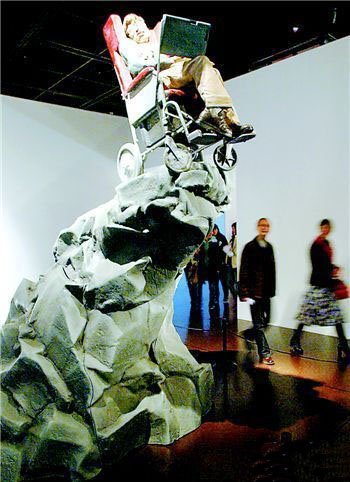| Tools: Save | Print | E-mail | Most Read |
| He Art Attack |
| Adjust font size: |
Made in fibreglass, resin and paint, the sculpture titled Ubermench is one of 25 pieces on show at the ongoing exhibition After the Shock, now on in Capital Museum. It features paintings, photography, video and installation works by "Young British Artists" (YBA), who came into prominence in the 1990s for their introspective examination of life, death, morbidity, sex and delinquency. The group caught the public eye at the 1997 exhibition Sensation, held at the Royal Academy of Arts in London. Among the exhibits were animals sliced up and placed in beautiful formaldehyde-filled boxes, a cow's rotting head being fed to flies and maggots, and a female artist's embroidered names of all the people she had slept with on the inside of a tent, an autobiographical metaphor of her body. The artists rapidly became famous in arguments engaging both ordinary viewers and critics on "what is art?" And the YBA phenomenon promoted the renaissance of British art in the 1990s, exerting an influence on artists worldwide, including China. "China's artists learnt about YBAs' works by word of mouth, public praise and a few catalogues older artists occasionally brought back from their travels," said Pi Li, one of the show's three curators. "Sometimes they had to guess at the meanings from a few square-centimeter images, but it was in this guessing that China's modern art found its path." The showpieces include 12 of the works by YBAs, among them now very famous names in the West, such as Damien Hirst, Tracey Emin and Douglas Gordon. In an installation titled Croque Mort, which refers to the person who as a legend has it would bite the feet of the recently deceased to check if they were really dead. In a series of seven pictures, the artist Douglas Gordon photographed his own new born baby biting her feet, and put the photos in a red room covered in a red carpet. With a sinister title and the close-up of a baby biting her own feet to check her physical existence in a womb-like room, Gordon was reminding viewers of their physical mortality. In 1994, controversial artist Tracey Emin undertook a journey across the United States, recording and reading for her autobiography. It was also a trip of self-discovery and analysis, in which Emin undertook a healing ritual by recounting painful personal memories including being raped, abortion, drunkenness, sexual intimidation and violence. Then, on a chair, the artist embroidered significant personal anecdotes and sewed on the names of all the places she had visited. The chair is exhibited as an artwork named There Is a Lot of Money in Chair. Other highlights include Turner Prize laureate Damien Hirst's Girls, who like boys, who like boys, who like girls, who like girls, like girls, like boys. The title is an adaptation of lyrics from a pop British band Blur's Boys and Girls. The exhibit comprises two round big plates, one pink and the other blue, on which the paint surface is encrusted with colored butterflies, and disquieting devices such as razors. From a distance, viewers will see only stunning butterflies in lovely colored plates, but a careful observation will lead them to discover the razors, reminding people of the danger lurking behind seduction and the impermanence of material beauty. Some of Hirst's best known works, like Away from the Flock which features a lamb preserved in formaldehyde and Tracey Emin's highly controversial My Bed, an installation famous for the bizarre combination of dotted bed sheets, the artist's underwear and condoms, are not included in the show, said Pi Li, citing problems with transportation. Although many of the most-shocking pieces of the artists are not being shown this time, many see it as a refreshing start by the Capital Museum, set up in 1981, to have a show themed on modern art. In past decades, the museum has been best known for its exhibitions featuring classic Chinese and international artworks and relics. "Our slogan is 'The Capital Museum, My Own Museum.' So we welcome all kinds of excellent shows from various time periods and styles," said Yao An, the museum's vice-director. Modern art is usually considered hard to understand, but the show's initiators do not see the making of a connection with viewers as a problem, placing their faith in the audience's growing taste and the exhibits' charm. Guo Xiaoyan, organizer of the Guangzhou Triennial, was also involved in selecting the showpieces and held an exhibition of them in Guangzhou last year. According to her, it was the most popular exhibition at the Guangzhou Museum of Art in 2006. "I think the pieces relate to the lives of the viewers, on the basic aspects of life, death and sex," she said. Guo recalled that even some elderly viewers appreciated the works and had their own interpretations, some of which were really stunning and fresh. "They are much more sharp in appreciating modern art than we imagine." The exhibition will end on May 11. The museum will provide both Chinese and and English-speaking guides. (China Daily March 22, 2007) |
| Tools: Save | Print | E-mail | Most Read |
 |
| Related Stories |
